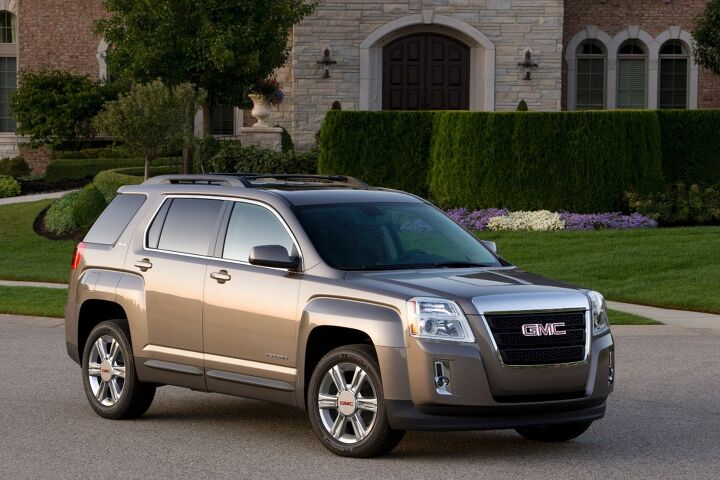With No New Product Promised, GM Canada Workers Could Walk Off the Job at Midnight

GM Canada and the union representing Detroit Three autoworkers north of the border have entered their final day of contract talks ahead of a midnight strike deadline.
Unless both sides achieve a breakthrough today, there’s little reason to believe a walkout at the company’s Oshawa, Woodstock and St. Catharines, Ontario facilities won’t occur as the clock strikes twelve.
A deal with Unifor hinges on new product commitment from GM Canada, especially for its Oshawa assembly plant. Product is drying up at the century-old plant, which could be shuttered within a couple of years if GM doesn’t allocate new vehicles to its two production lines.
As of yesterday, the product pipeline was still dry, even as Unifor president Jerry Dias put on a cautiously hopeful face.
“I’m feeling much better today than I did yesterday but I’m still not feeling great,” Dias told the Globe and Mail. “We are having some constructive conversations, finally.”
Last week, both sides were said to be far apart in negotiations, with little to no movement on the key bargaining issue. Despite Dias’ claims, a “high-ranking” union source told the newspaper that GM has not offered any new product for the Oshawa plant, which employs about 2,500 hourly workers.
Hampering the talks is the simple reality that GM has no product to send to Oshawa. The automaker’s roster of existing and planned vehicles are all allocated to other plants, while the Oshawa-built Chevrolet Impala, Buick Regal and Cadillac XTS (as well as overflow Chevrolet Equinox production) can easily be sent elsewhere.
GM is Unifor’s target company in this round of contract talks. Any agreement with that automaker will guide contract talks with the remaining two. In the event of a strike, GM Canada’s CAMI assembly plant, covered by a separate collective agreement, has vowed to not use replacement parts sent from U.S. plants. That could halt the production of Equinox and GMC Terrain crossovers.
[Image: General Motors]

More by Steph Willems
Latest Car Reviews
Read moreLatest Product Reviews
Read moreRecent Comments
- Mebgardner I test drove a 2023 2.5 Rav4 last year. I passed on it because it was a very noisy interior, and handled poorly on uneven pavement (filled potholes), which Tucson has many. Very little acoustic padding mean you talk loudly above 55 mph. The forums were also talking about how the roof leaks from not properly sealed roof rack holes, and door windows leaking into the lower door interior. I did not stick around to find out if all that was true. No talk about engine troubles though, this is new info to me.
- Dave Holzman '08 Civic (stick) that I bought used 1/31/12 with 35k on the clock. Now at 159k.It runs as nicely as it did when I bought it. I love the feel of the car. The most expensive replacement was the AC compressor, I think, but something to do with the AC that went at 80k and cost $1300 to replace. It's had more stuff replaced than I expected, but not enough to make me want to ditch a car that I truly enjoy driving.
- ToolGuy Let's review: I am a poor unsuccessful loser. Any car company which introduced an EV which I could afford would earn my contempt. Of course I would buy it, but I wouldn't respect them. 😉
- ToolGuy Correct answer is the one that isn't a Honda.
- 1995 SC Man it isn't even the weekend yet


































Comments
Join the conversation
So unless the company allocates more production there instead of somewhere that makes (more?) money, they are going to stop working? I'm understanding why GM needed to be bailed out.
A decade ago the Canadian and Ontario Governments paid billions to take 11.7% ownership in GM to help save them from a forced rummage sale. In a sane world that taxpayer investment would have come with long-term requirements for GM to keep a certain percentage of its global production in Canada. In a saner world GM would have been sold piecemeal and the Canadian factories would have different owners. Most likely, those owners wouldn't have the financial and political clout to survive a strike by Unifor. Instead we have the current situation, where GM is flush with cash and holds all the cards. Like it or not, the power of the auto workers has always been the threat of a strike...Mutual Assured Destruction, if you will. Now, the survival of GM is secured not by compromise with the workers but by the US and Canadian Govts. Without the power to bring GM to its knees, Unifor is reduced to begging its Govt to give GM more handouts so GM will continue to employ them. In short, the belief that GM is 'too big to fail' has sacrificed the interests of auto workers in favor of the interest of GM. Funny how those heartfelt plans to save the working class always entail giving large corporations loads of money, and always have the "unintended" consequence of screwing the middle class.